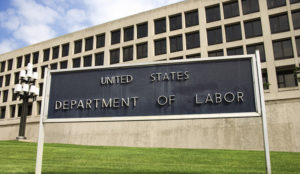
Government shutdown ends, OSHA rescinds injury reporting requirement, and more…
IN THE NEWS
- President Donald Trump signed a bill to fund the federal government through February 15, ending the 35-day government shutdown. President Trump praised both parties for being “willing to put partisanship aside” but reaffirmed the need for walls in “pre-determined high-risk locations,” which the bill does not fund.
- In spite of the shutdown, the Occupational Safety and Health Administration (OSHA) issued a final rule rescinding a requirement for employers to report worker injuries and illnesses electronically. The U.S. Department of Labor stated that the rule would “protect worker privacy” by preventing the collection of information “that may be quite sensitive.” Advocacy groups have filed a lawsuit in response, stating that OSHA “has failed to provide a reasoned explanation for its change in position” and “failed to adequately consider comments” opposing the change.
- The U.S. Department of Justice charged Chinese telecommunications company Huawei with engaging in business in Iran in violation of United States sanctions on the country. Huawei allegedly “engaged in a fraudulent financial scheme that is detrimental to the security of the United States,” U.S. Secretary of Homeland Security Kirstjen Nielsen said. Huawei denied wrongdoing on the part of the company or its chief financial officer, Meng Wanzhou, who was also charged.
- The U.S. Court of Appeals for the D.C. Circuit will hear oral arguments in a case challenging the Federal Communications Commission’s (FCC) rollback of net neutrality rules. The plaintiffs accuse the FCC of disregarding “the law, the facts,” and “reasoned” decision-making, but Matthew Berry, chief of staff to FCC Chairman Ajit Pai, reportedly stated that the agency has “every reason to believe” that the rollback will be upheld based on U.S. Supreme Court precedent.
- A report reportedly claimed that the U.S. Environmental Protection Agency (EPA) will not establish a drinking water limit for two toxic chemicals. EPA Acting Administrator Andrew Wheeler had earlier refused to set standards for the toxic chemicals during his confirmation hearing. EPA called the report “premature” and said that “EPA has not finalized or publicly issued” the plan for managing the toxic chemicals.
- The Congressional Budget Office released a report on the budget and economic outlook for the next 10 years. In the report, the office estimates that President Donald J. Trump’s tariffs “will reduce the level of real U.S. GDP by roughly 0.1 percent, on average, through 2029.” In addition, the report states that “foreign producers will absorb more of the tariffs’ costs in the short term, but domestic consumers and businesses will bear more of the costs over time.”
- Pennsylvania Governor Tom Wolf (D) proposed raising the state’s minimum wage to $12 an hour, with plans to reach $15 an hour by 2025. “When workers are paid fairly, fewer people will need public assistance,” the governor’s office said. Governor Wolf had previously proposed raising the minimum wage on four separate occasions, each of which failed in the Republican-controlled state legislature.
- In a 6-0 vote, the New York State Gaming Commission approved a package of proposed regulations that would allow sports wagering “as an authorized casino game” in the state. The rules would not explicitly authorize any type of mobile betting, but would instead mandate that all wagers “be placed within a sports wagering lounge” or other location “within the gaming facility.” The Commission will reportedly accept public comments for a 60-day period before voting for final approval on the regulations.
- Israel’s government approved a law that would authorize the export of medical marijuana to countries where it is legal. Justice Minister Ayelet Shaked reportedly praised the move as opening “a very big market” to Israel’s agriculture sector. Exports are reportedly expected to raise Israel’s tax revenues by approximately $273 million.
- Ride-hailing companies Uber and Cabify have suspended their on-demand operations in Barcelona, Spain after a new regulation took effect this week, which requires ride-hailing drivers to wait 15 minutes before picking up passengers who request rides. Uber Spain contended that the regulation is “totally incompatible” with the ride service, and instead it called for “fair regulation” that “takes into account the thousands of drivers and users” who depend on the service.
- Facebook announced new efforts to combat misleading and fake news in the run-up to worldwide elections. The social network claimed it is focusing on improving transparency of political advertisements, building resources in Europe and Asia to quickly respond to misinformation, and expanding its fact-checking program.
WHAT WE’RE READING THIS WEEK
- The effects of the government shutdown will continue to affect the Supplemental Nutrition Assistance Program (SNAP) even though the government has reopened, wrote Abby Church in an article for James Madison University’s The Breeze. SNAP—which provides monetary assistance for low-income families to purchase food—issued participants’ February benefits in mid-January as a result of the government shutdown, Church wrote. But many people who received benefits may not realize that the January payment is meant to last until the end of February, which Church argued could result in food insecurity and a higher demand for food bank assistance.
- U.S. Immigrations and Customs Enforcement (ICE) arrests at New York courthouses in 2018 spiked to 17 times the number of arrests in 2016, according to an Immigrant Defense Project (IDP) report. The IDP alleged that ICE also eavesdropped on confidential attorney-client conversations between immigrants and their counsel and that ICE “stepped up arrests of youth.” In addition, the IDP claimed that ICE “routinely ignored its own regulations” by dressing in plain clothes without badges and failing to provide information justifying arrests.
- Revenues for European soccer clubs have risen in recent years, and “financial fair play” regulations may help European leagues restore “competitive balance,” wrote Vsevolod Grabar of the National Research University Higher School of Education and Konstantin Sonin of the University of Chicago in a recent paper. As stakes have risen, several clubs have overspent and found themselves in financial trouble, while more successful clubs have earned a disproportionate amount of money from tournaments, television deals, and outside investors. Grabar and Sonin found that the financial fair play regulations—limiting the amount of debt a club can take on—encourage investors to invest in less wealthy clubs, enabling these clubs to stay competitive.



